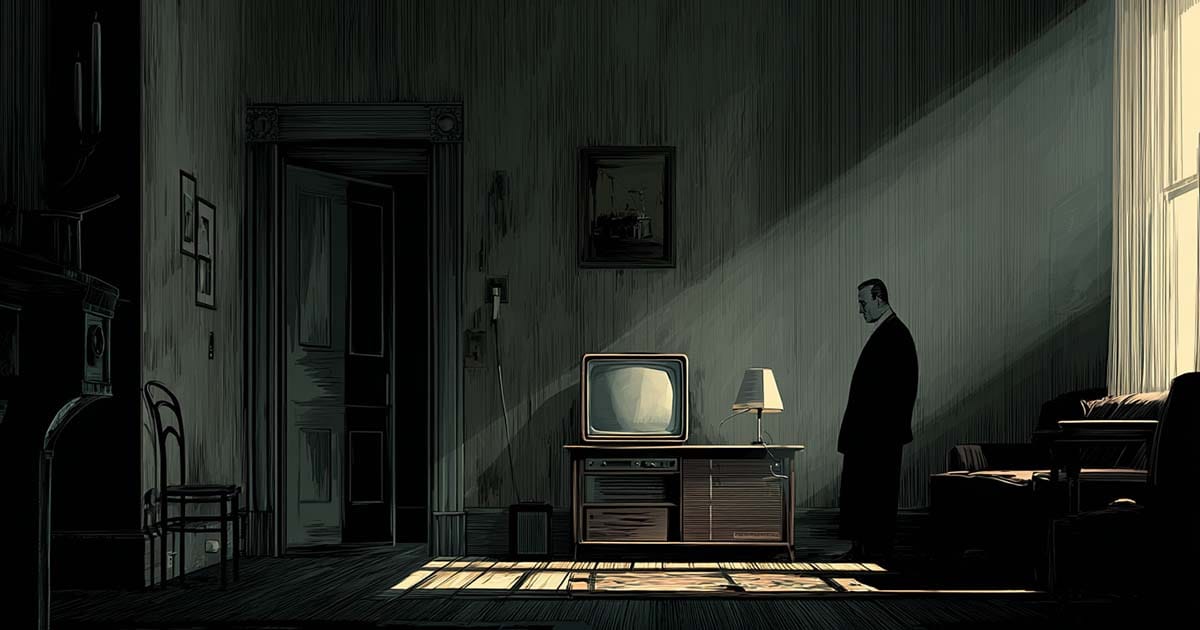The Man Who Dreamed in Doubt
Philip Okay. Dick wrote “Circulation My Tears, the Policeman Stated” throughout a decade that questioned each establishment. The novel arrived in 1974 when America’s religion in authorities was operating skinny and expertise promised each order and intrusion.
Readers who had grown up with the optimism of the house age now confronted an age of suspicion. Dick understood that doubt could possibly be extra terrifying than any alien invasion.
He was already identified for tales wherein actuality slipped like sand via the fingers. “Do Androids Dream of Electrical Sheep” had requested what it meant to be human, whereas “Ubik” had requested if time itself could possibly be trusted. “Circulation My Tears” turned inward. It studied not the equipment of false worlds however the soul of a person who wakes to seek out his personal identify erased.
On this story, Dick appeared much less involved with the spectacular and extra with the intimate panic of vanishing from reminiscence. The novel’s science fiction setting serves as background to an emotional fact about how id is dependent upon recognition. It feels each trendy and old style. Trendy in its discuss of knowledge and information, old style in its perception {that a} man’s value is measured by the eyes that keep in mind him.
By the mid-seventies, Dick was writing with uncommon readability. The wild invention of his early novels gave approach to a gentle, virtually sorrowful tone. “Circulation My Tears” exhibits a author who had seen an excessive amount of of confusion and wished to know it. What he discovered was not order, however grace in uncertainty.
The Stage of Management Society, Energy, and the Vanished Self
The world of “Circulation My Tears, the Policeman Stated” is a disciplined one. Each citizen carries identification, and people with out it face arrest. The federal government has turn out to be a surveillance machine that rewards obedience and punishes even minor acts of independence. It’s a chilly society that measures value via documentation.
Philip Okay. Dick paints this setting with out heavy rationalization. The reader senses the concern in each routine alternate, the quiet dread of being observed by authority. What makes this world scary shouldn’t be its violence however its effectivity. Each rule seems logical, each system justified, but all humanity leaks out via the cracks.
There’s an echo of Orwell’s “1984” within the fixed watchfulness. There’s additionally a contact of Bradbury’s “Fahrenheit 451” within the unhappiness of those that keep in mind freedom however can not identify it. Dick’s model is extra intimate. As a substitute of open riot, he provides erasure. The central horror shouldn’t be that the state kills its residents, however that it forgets them utterly.
The concept of the vanished man mirrors American anxieties of the Nineteen Seventies. Know-how was shifting from promise to menace, and privateness was shrinking. Dick’s story speaks to the concern {that a} clerical act may erase an individual, that life itself would possibly rely upon a file or card. His future feels bureaucratic somewhat than barbaric. The hazard lies not in tyranny by power however in tyranny by file preserving.
What offers this society its energy shouldn’t be solely the state however the residents who settle for it. Individuals cooperate out of behavior, grateful for construction. Dick noticed how order can turn out to be a consolation that dulls conscience. The world of “Circulation My Tears” reminds us that when males commerce freedom for security, they threat dropping even the reminiscence of who they have been.
Characters within the Maze Taverner, Buckman, and the Human Core
Jason Taverner lives on the high of his world. He’s well-known, admired, and sure of his significance. When that certainty vanishes, the person beneath the movie star is revealed.
His journey shouldn’t be about discovering who erased him however about discovering what stays when applause stops. Dick offers him the uneasy allure of a person who has all the time lived below vivid lights but feels the shadows urgent in.

Taverner’s disaster turns into a research in dependence. He learns that fame can not defend him and that id shouldn’t be self-made. Every encounter forces him to face the bounds of his management. Dick’s sympathy for Taverner retains the story from turning cynical. The character is flawed however recognizably human, caught between delight and the longing to be identified.
Common Felix Buckman is Taverner’s mirror. The place Taverner loses id, Buckman carries an excessive amount of of it. He embodies the state’s energy whereas hiding his loneliness behind self-discipline. His authority masks an ache for connection. By means of him, Dick offers the novel its ethical distinction, exhibiting how even a servant of oppression can really feel the load of conscience.
The connection between these two males varieties the emotional core of the e-book. Their conferences are marked by unease and mutual recognition. Each perceive what it means to be trapped in techniques bigger than themselves. Dick’s restraint in portraying them offers the novel its quiet power. He lets their decisions and silences reveal the tragedy of males who see the reality too late.
In contrast with earlier Dick heroes, Taverner and Buckman really feel grounded. They don’t seem to be wanderers in cosmic hallucinations however residents of a recognizable future. This focus offers the novel its depth. It’s not a puzzle about alternate realities, however a portrait of strange males confronting the vacancy behind certainty. Dick’s perception lies in exhibiting that humanity’s best battle shouldn’t be in opposition to machines, however in opposition to the hollowness inside.
Themes of Reminiscence, Religion, and the Fractured Actual
“Circulation My Tears, the Policeman Stated” revolves round the concept that reminiscence defines being. In Dick’s world, a person’s existence is dependent upon what’s recorded about him. When these information vanish, so does his proof of life. The story turns into a meditation on how fragile id will be when it depends on the techniques that encompass it. The menace shouldn’t be dying however forgetting.
Reminiscence within the novel is each mechanical and emotional. Computer systems retailer knowledge, however hearts retailer which means. Dick contrasts the 2 with care. His characters cling to small tokens of recognition, a reputation remembered, a second of mercy, a face that also remembers their very own. By means of this distinction, he asks what actually sustains an individual. The suggestion is that the soul endures not due to documentation however due to love.
There’s additionally a quiet sense of religion beneath the floor. Dick’s worlds typically really feel deserted by God, but they nonetheless yearn for the divine. “Circulation My Tears” carries this craving extra gently than his earlier, harsher works. The unseen order that strikes occasions could also be destiny, insanity, or grace. Dick leaves it unresolved, trusting the reader to sense that even in chaos one thing merciful stirs.
The title deepens the temper. Drawn from John Dowland’s track “Circulation My Tears,” it brings the unhappiness of an older age into a contemporary nightmare. The music’s sorrow echoes in each scene. It reminds the reader that grief will be noble when it results in understanding. The novel’s tone is mournful however by no means hopeless.
In contrast with the fever of “A Scanner Darkly,” this story feels composed, virtually prayerful. Dick appears to have traded his earlier frantic questioning for reflection. The world stays unsure, however he treats it with tenderness. Beneath the surveillance and the loss there runs a quiet perception that man is greater than his circumstances.
Ultimately, “Circulation My Tears, the Policeman Stated” turns into much less a warning than a lament. It mourns the disappearance of belief, of religion, of the human face in a mechanical age. But even in its sorrow, there’s a trace of redemption. Dick means that to recollect each other is to withstand the void. Reminiscence, religion, and love kind the final defenses of the actual.

Legacy and Closing Judgment The Quiet Gentle Behind the Darkness
When “Circulation My Tears, the Policeman Stated” reached readers within the Nineteen Seventies, critics have been divided. Some known as it considered one of Philip Okay. Dick’s most coherent works. Others felt its rationalization weakened the thriller it had so rigorously constructed. But even those that doubted its construction agreed that it carried emotional weight past most science fiction of its time. It received the John W. Campbell Memorial Award and secured Dick’s place as greater than a author of unusual futures. He had turn out to be a author of ethical visions.
The novel’s endurance lies in its honesty. It speaks to the concern of vanishing into the background noise of recent life. That concern has solely grown with expertise’s attain. Dick’s imagined world of identification techniques and state management feels much less distant now. Readers acknowledge themselves in Taverner’s confusion and in Buckman’s seek for which means inside authority. The story holds a mirror to any age that forgets the price of the person.
What separates this e-book from the mechanical dystopias that adopted is its compassion. Dick by no means lets despair have the ultimate phrase. He knew that equipment may fail, however that conscience may survive. His future is scary, but it’s also a spot the place a single act of mercy can nonetheless shine. That perception offers the e-book its endurance.
In its quiet manner, “Circulation My Tears, the Policeman Stated” reminds the reader that even in a world constructed on documentation, the soul can’t be filed away. The characters’ small awakenings recommend that id shouldn’t be granted by techniques however revealed by love and reminiscence. Dick’s imaginative and prescient, darkish because it appears, leaves a light-weight burning on the finish. It’s the mild of recognition, the one which tells us we’re seen, and subsequently nonetheless alive.

